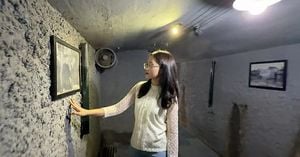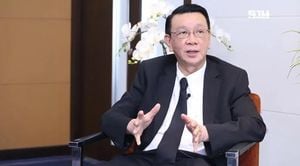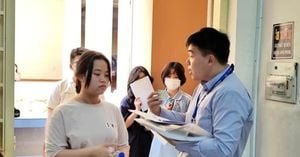Allegations have surfaced surrounding the distribution of encrypted communication devices, known as 비화폰, to South Korea's First Lady, Kim Kun-hee, prompting intense scrutiny from lawmakers. During recent hearings of the National Assembly, officials faced challenging questions about the appropriateness of providing such sensitive devices to the presidential couple.
On January 22, during the first hearing of the National Assembly's inquiry committee investigating potential coup-related allegations against the government, representative Yoon Gun-young of the Democratic Party raised questions about whether Kim Kun-hee received one of these encrypted phones, which are typically reserved for high-ranking officials handling national security matters.
Kim Seong-hoon, the acting head of the Presidential Security Service, responded to the congressman's inquiry by stating, “I cannot confirm this.” Yoon pressed on, stating he received reports indicating the specific model of the phone provided to Kim Kun-hee was the S20 5G model, raising serious concerns about why the First Lady would require such secure communication tools.
Further questions revealed more about the distribution of encrypted devices. Yoon illustrated the broader implication by asking if the Presidential Security Service supplied other high-ranking members of the government, including ministers, with similar devices. He stated, “Is there any valid reason for the First Lady to have been issued such high-security equipment?” The inquiries prompted responses from Kim, who reiterated, “I cannot provide specifics about such security matters.”
The controversy aligns with insights provided by Another lawmaker, Yong Hye-in, who informed the committee last week about the communication devices used by five ministers during the national emergency declaration, which could pose significant security and ethical questions if the encrypted devices were used for undisclosed communications during sensitive government actions.
This raises alarm bells about whether secure communications among officials could have been used unlawfully, particularly during the declaration of martial law, invoking fears about potential misuse of power or security breaches within the government.
These encrypted phones are typically employed by those involved directly with national secrets, including members of the Cabinet, military officers, and intelligence agency personnel. They are equipped with advanced encryption technology to prevent eavesdropping or unauthorized data access. The suggested provisioning of such technology to the First Lady, whose role does not traditionally involve national security, has raised eyebrows, drawing criticism from various quarters.
The situation escalated when it was noted during the inquiry hearing on January 18, where it was disclosed, by other lawmakers, the communications of key ministers were monitored using these phones at pivotal moments leading to the emergency declaration.
The appropriateness of supplying the First Lady with this high-security technology is under professional and public scrutiny. While Kim Seong-hoon maintained there is no breach of protocol, the lawmakers emphasized the need for transparency and accountability concerning national security devices being allocated without clear justification.
During the hearings, according to lawmaker Yoon Gun-young, if the information proves accurate, it could provide insight not only about the appropriateness of such device distributions during sensitive governmental operations but also about possible secret communications among the ranks of lawmakers and high officials, which might contravene ethical governance practices.
The inquiry is expected to continue as the Assembly presses for accountability from the government officials involved amid calls for clarity and rectification of security protocols. Members of the Assembly seek reassurance from the Presidential Security Service about operational integrity concerning the deployment and regulation of high-security phones.
While Kim Seong-hoon described the security of communication devices as highly confidential and stated he could not divulge extensive details, concerns remain high among public observers and politicians about the intersections of privacy, security, and authority.
The flow of information concerning this issue remains tightly controlled, with very few concrete details being released. This has led those involved to demand more transparency on these unprecedented allegations.
It remains uncertain how this situation will influence the public's trust moving forward, especially with forthcoming elections looming. Lawmakers and advocacy groups are calling on continuous monitoring of information flow between high-ranking officials, which will be integral to maintain oversight of government actions.
The public continues to watch closely as the inquiry develops, with expectations for direct accountability from the authorities involved. The inquiry proceedings will define how the current administration manages not only existing allegations but the broader question of governance integrity itself.
Time will tell how this situation will resolve, but one thing is clear: heightened scrutiny is here to stay for the administration involved, especially concerning national security protocols and their application to individuals not directly connected with such roles.



